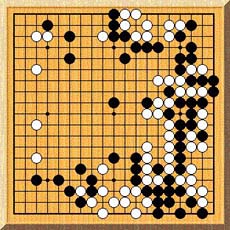index
About the identity of formal systems
click on images for full-size:



Brick sculpture with holes in it, Per Kirkaby

Diagram of a position in the game of Go
Formal systems taken in the abstract are just sets of directions for combining elements. They have no fixed essences, so any change in the rules creates a new system.-- Objection: if then every 'mistake' makes a new system what identity do they have? -- Not every mistake makes a consistent system. Furthermore, formal systems that exist are embodied, and this means there is some resistance to changing them. Social practices have inertia to them, which conflicts with the fragility of formal systems.-- But that's the issue again: those practices, do they have guidance from grammars and formal systems? -- We should not make the mistake of equating a grammar with a formal system. Though I admit that I tend that way, perhaps coming from my early exposure to Wilfrid Sellars and my dissertation work with Stephan Körner. I correct myself with influences from Derrida and others about the status of formal systems within contexts and processes they don't define or control. But those deconstructive (and other) influences have their own misconceptions.
- [Return to "Place Grammars"]
- [Continue on the objections path]
- [Nearby: Objections and replies -- About the necessity of links -- About the practical details ]